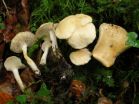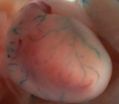(Press-News.org) In collaboration with the Royal Botanic Gardens of Madrid and the Slovenian Forestry Institute, researchers in the Basque Country have documented two new species of Hydnum, commonly known as ox tongue mushrooms, as part of their study published in the 'Mycologia' journal. This genus is known because many of its fungi are edible.
Spanish researchers have headed the discovery of two mushroom species belonging to the Hydnum genus, a type of fungus commonly used in cooking.
"During our study we discovered two new species: Hydnum ovoideisporum and Hydnum vesterholtii, which belong to a genus commonly known as 'ox tongue'. Although many of this species' mushrooms are consumed in many parts of the world, paradoxically there have been few recent serious studies that attempt to clarify what species exist and the differences between them," as explained to SINC by Ibai Olariaga Ibarguren, lead researcher of the study conducted from the University of the Basque Country.
According to the experts, differentiating this genus is a very complicated task since there is much resemblance between species and they have rather similar microscopic characteristics. "This is one of the reasons why many authors of studies have believed that there are few Hydnum species with different variables," outlines the scientist.
Nonetheless, the scarcity of molecular studies carried out on these fungi indicates that their genetic diversity is very high. Olariaga himself has been performing a review of this genus in the Iberian Peninsula for years. One day he discovered that there were two species that were distinguishable from the rest because of their specific ecology and the fact that they had ovoid basidiospores, instead of the blastospores in the majority of species.
"The molecular study that our work provides confirmed that the species detected at the time using classical morphology-based taxonomy belonged to two genetically different lineages," highlights the researcher.
Recognising collected species
Since they cannot be cultivated, species belonging to the Hydnum genus are collected from natural ecosystems in large quantities. They are not poisonous, which is one of the reasons why great emphasis has not been placed on differentiating them.
Nonetheless, very little is known about how widespread they are, their ecology and whether those being collected are an endangered species or under threat of extinction or, on the contrary, a very common species.
"This type of study allows us to delve deeper into these aspects and gain precise information that can be interesting from an applied point of view, since it is necessary to know for example if one or a few species produce certain secondary metabolites or molecules of industrial interest," explains Olariaga.
It is probable that the collectors have consumed these two new species since Hydnum mushrooms are phylogenetically related to Cantharellus (chanterelles) and Clavulina (coral fungi) and they all have edible species. "It would be highly unlikely that these two species documented were not actually edible."
INFORMATION:
References:
Ibai Olariaga, Tine Grebenc, Isabel Salcedo, María P. Martín. "Two new species of Hydnum with ovoid basidiospores: H. ovoideisporum and H. Vesterholtii" Mycologia, 104(6):1443-55, December 2012. doi:10.3852/11-378.
2 new species of mushroom documented in the Iberian Peninsula
2013-02-26
ELSE PRESS RELEASES FROM THIS DATE:
EARTH: Setting sail on unknown seas
2013-02-26
Alexandria, VA – On June 5, 2012, a massive dock made landfall on Oregon's Agate Beach, just north of Newport. The dock carried with it a host of castaways, including as many as a hundred species of mollusks, anemones, sponges, oysters, crabs, barnacles, worms, sea stars, mussels and sea urchins. A placard on the side written in Japanese revealed that the dock had been unmoored from the Japanese coastal city of Misawa during the catastrophic tsunami on March 11, 2011, bringing with it an essentially intact subtidal community of Asian species to the Pacific Northwest. Although ...
Pain can be a relief
2013-02-26
If you accidently kick your toe against a doorframe you are probably going to find it very painful. As a purely intellectual experiment, imagine purposefully kicking a doorframe hard enough to potentially break your toe. When it turns out your toe has been battered but not broken, the pain may be interpreted more as a relief.
"It is not hard to understand that pain can be interpreted as less severe when an individual is aware that it could have been much more painful. Less expected, however, is the discovery that pain may be experienced as pleasant if something worse ...
When morning sickness lasts all day
2013-02-26
Almost all women experience some nausea or vomiting when pregnant. Approximately one out of every hundred suffers from acute nausea during pregnancy (hyperemesis gravidarum) and may need hospital treatment to restore hydration, electrolytes and vitamins intravenously.
"At worst, women may die if they go untreated. Many women find that the condition has an adverse effect on their work and family lives," states Åse Vikanes, senior researcher at the Norwegian Institute of Public Health and specialist in gynaecology and obstetrics.
Making up for insufficient research activity ...
Blood vessels 'sniff' gut microbes to regulate blood pressure
2013-02-26
Researchers at The Johns Hopkins University and Yale University have discovered that a specialized receptor, normally found in the nose, is also in blood vessels throughout the body, sensing small molecules created by microbes that line mammalian intestines, and responding to these molecules by increasing blood pressure. The finding suggests that gut bacteria are an integral part of the body's complex system for maintaining a stable blood pressure.
A description of the research, conducted in mice and test tubes, appeared online Feb. 11 in the journal Proceedings of the ...
Cell discovery could hold key to causes of inherited diseases
2013-02-26
Fresh insights into the protective seal that surrounds the DNA of our cells could help develop treatments for inherited muscle, brain, bone and skin disorders.
Researchers have discovered that the proteins within this coating – known as the nuclear envelope – vary greatly between cells in different organs of the body.
This variation means that certain disease causing proteins will interact with the proteins in the protective seal to cause illness in some organs, but not others.
Until now scientists had thought that all proteins within the nuclear envelope were the ...
Afterschool programs evaluated for community support, resources
2013-02-26
UNIVERSITY PARK, Pa. -- Afterschool programs seem to be most effective when their organization and implementation is supported by both organizational and community resources, according to Penn State human development researchers.
Using a tool to help bridge the gap between research and real life, the researchers evaluated an afterschool program called the Good Behavior Game.
"The Interactive System Framework for Dissemination and Implementation is the tool that helps us to bridge research and practice by synthesizing the available research and figuring out what it ...
In probing mysteries of glass, researchers find a key to toughness
2013-02-26
New Haven, Conn. — In a paper published online Feb. 26 in the journal Nature Communications, a Yale University team and collaborators propose a way of predicting whether a given glass will be brittle or ductile — a desirable property typically associated with metals like steel or aluminum — and assert that any glass could have either quality.
Ductility refers to a material's plasticity, or its ability to change shape without breaking.
"Most of us think of glasses as brittle, but our finding shows that any glass can be made ductile or brittle," said Jan Schroers, a professor ...
Connecting the (quantum) dots
2013-02-26
PITTSBURGH—Recent research offers a new spin on using nanoscale semiconductor structures to build faster computers and electronics. Literally.
University of Pittsburgh and Delft University of Technology researchers reveal in the Feb. 17 online issue of Nature Nanotechnology a new method that better preserves the units necessary to power lightning-fast electronics, known as qubits (pronounced CUE-bits). Hole spins, rather than electron spins, can keep quantum bits in the same physical state up to 10 times longer than before, the report finds.
"Previously, our group ...
American Chemical Society podcast: New super-nutritious puffed rice for breakfast cereals, snacks
2013-02-26
The latest episode in the American Chemical Society's (ACS') award-winning Global Challenges/Chemistry Solutions podcast series reports a new process for blowing up grains of rice to produce a super-nutritious form of puffed rice, with three times more protein and a rich endowment of other nutrients. That makes it ideal for breakfast cereals, snack foods and nutrient bars for school lunch programs.
Based on a report by Syed S.H. Rizvi, Ph.D., and colleagues in ACS' Journal of Agricultural and Food Chemistry, the new podcast is available without charge at iTunes and from ...
Persistent negative attitude can undo effectiveness of exposure therapy for phobias
2013-02-26
COLUMBUS, Ohio – Because confronting fear won't always make it go away, researchers suggest that people with phobias must alter memory-driven negative attitudes about feared objects or events to achieve a more lasting recovery from what scares them the most.
Ohio State University psychology researchers determined that people who retained negative attitudes about public speaking after exposure therapy were more likely to experience a return of their fear a month later than were people whose attitudes were less negative. The fear returned among those with unchanged attitudes ...

